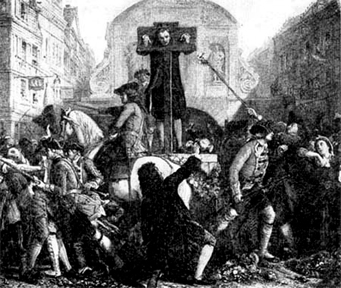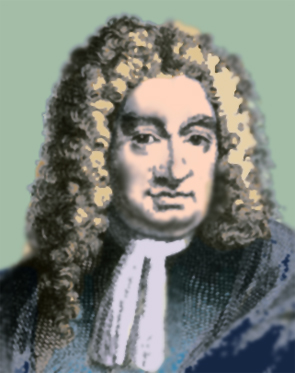Daniel Defoe
From the Quicksilver Metaweb.
This is a page for Daniel Defoe
Stephensonia
There be pirates. Still trying to think as to why members of the Waterhouse clan would know of speciality prostitutes to warn Daniel of them.
Authored entries
- Stephenson:Neal:Quicksilver:80:Stourbridge Fair (Alan Sinder)
- Stephenson:Neal:Quicksilver:93:The Plague Year (Alan Sinder)
Daniel Defoe
Mostly from Wikipedia, the free encyclopedia.
Daniel Defoe
pilloried for dissent while a crowd of sympathizers
attempt to give him food and water
Daniel Defoe (1660 - April 21, 1731), the English writer, gained fame for his novel Robinson Crusoe.
Biography
Born Daniel Foe, the son of James Foe, a butcher in the Stoke Newington neighbourhood of London, England, he would later add the aristocratic sounding "De" to his name as a nom de plume. He became a famous pamphleteer, journalist and novelist at a time of the birth of the novel in the English language, and thus fairly ranks as one of its progenitors.
Defoe was born into a dissenting family some time between 1660 and 1665. He is thought to have fought on the losing side at Monmouth's rebellion in 1685, being lucky enough to be with the horse which was swept off the field during the early stages of the battle. He was also lucky that he was not named as a traitor. Not for the first time in his life, he went into hiding - possibly on the continent. He had some notoriety during his lifetime but also remained a shadowy figure. What recorded facts there are have to be supplemented by his own (unreliable) and other's accounts. He originally considered the ministry but chose instead trade which he was never very good at. He married Mary Tuffley in 1684 and received a dowry of £3,700 which he proceeded to squander on speculation that led to his bankruptcy in 1692, with debts of 17,000. Within ten years he had paid off all bar £5,000 but the rest he never cleared and debt was to plague him the rest of his life.
The Stocks
Defoe's pamphleteering and political activities resulted in his arrest and placement in a pillory on July 31, 1703, principally on account of a pamphlet entitled "The Shortest Way with Dissenters", in which he ruthlessly satirised the High Anglican Tories, purporting to argue for the extermination of dissenters. The publication of his poem "Hymn to the Pillory", however, caused his audience at the pillory to throw flowers instead of the customary harmful and noxious objects, and to drink to his health.
Spy
After his three days in the pillory Defoe went into Newgate Prison. Robert Harley, 1st Earl of Oxford and Mortimer, brokered his release in exchange for Defoe's co-operation in acting as an intelligence agent for the Tories. After the Tories fell from power, Defoe continued doing intelligence work for the Whig government. At some point, Defoe was recruited as a spy. This may have been in1695, when he was appointed to the post (possibly a cover) of accountant to commissioner's of the glass duty. Certainly, the Secretary of State, Robert Harley, was instrumental in obtaining his release. In 1706 he was sent up to Scotland as an agent working towards the Act of Union. Defoe's own unreliable testimony to this time was that he was involved in "a special service...in which I had to run as much risk of my life as a grenadier upon a counterscarp".
Harley was dismissed from the government in 1708. Defoe then left his employ and went to work for Godolphin. During this time he edited and wrote the pro-Whig "Review" newspaper. In 1710 Harley returned to office and Defoe went back to working for him again. In 1714 he was imprisoned for libel but continued to produce his newspapers. He was freed on the orders of the Secretary of State, Lord Townsend. He then resumed his spying during the period of the 1715 Jacobite Rebellion.
Writing
Defoe's famous work, arguably the first novel written in English, Robinson Crusoe (1719), tells of a man's shipwreck on a desert island and his subsequent adventures. The author may have based his narrative on the true story of the marooning of Alexander Selkirk. [1]
Defoe wrote an account of the Great Plague of 1665: A Journal of the Plague Year.
A Journal of the Plague Year is a novel by Daniel Defoe: ... the fury of the contagion was such at some particular times, and people sickened so fast and died so soon, that it was impossible, and indeed to no purpose, to go about to inquire who was sick and who was well, or to shut them up with such exactness as the thing required, almost every house in a whole street being infected, and in many places everyperson in some of the houses; and that which was still worse, by the time that the houses were known to be infected, most of the persons infected would be stone dead, and the rest run away for fear of being shut up; so that it was to very small purpose to call them infected houses and shut them up, the infection having ravaged and taken its leave of the house before it was really known that the family was any way touched.
He also wrote Moll Flanders (1722), a picaresque first-person narration of the fall and eventual redemption of a lone woman in 17th century England. She appears as a whore, bigamist and thief, commits adultery and incest, yet manages to keep the reader's sympathy. Both this work and Roxana, The Fortunate Mistress (1724) offer remarkable examples of the way in which Defoe seems to inhabit his fictional (yet "drawn from life") characters, not least in that they are women.
Daniel Defoe died on April 21, 1731 and was interred in Bunhill Fields, London, England. Some experts think Defoe was the Captain Charles Johnson who wrote "A General History of the Robberies and Murders of the Most Notorious Pyrates" If Johnson did exist, nothing is known of him apart from the fact that he is supposedly the author of this work and possibly the writer of a play about a pirate, called Avery. Some historians, though not all, attribute the work to Daniel Defoe on the basis of style and circumstantial evidence.
Daniel Defoe
Quotations
One day, about noon, going towards my boat, I was exceedingly surprised with the print of a man's naked foot on the shore, which was very plain to be seen on the sand. from Robinson Crusoe
and let any one judge what must be the anguish of my mind, when I came to reflect that this was certainly no more or less than my own mother, and I had now had two children, and was big with another by my own brother, and lay with him still every night. I was now the most unhappy of all women in the world. Oh! had the story never been told me, all had been well; it had been no crime to have lain with my husband, since as to his being my relation I had known nothing of it.- from Moll Flanders
Wherever God erects a house of prayer The Devil always builds a chapel there; And 'twill be found, upon examination, The latter has the largest congregation. (from The True-Born Englishman, 1701)